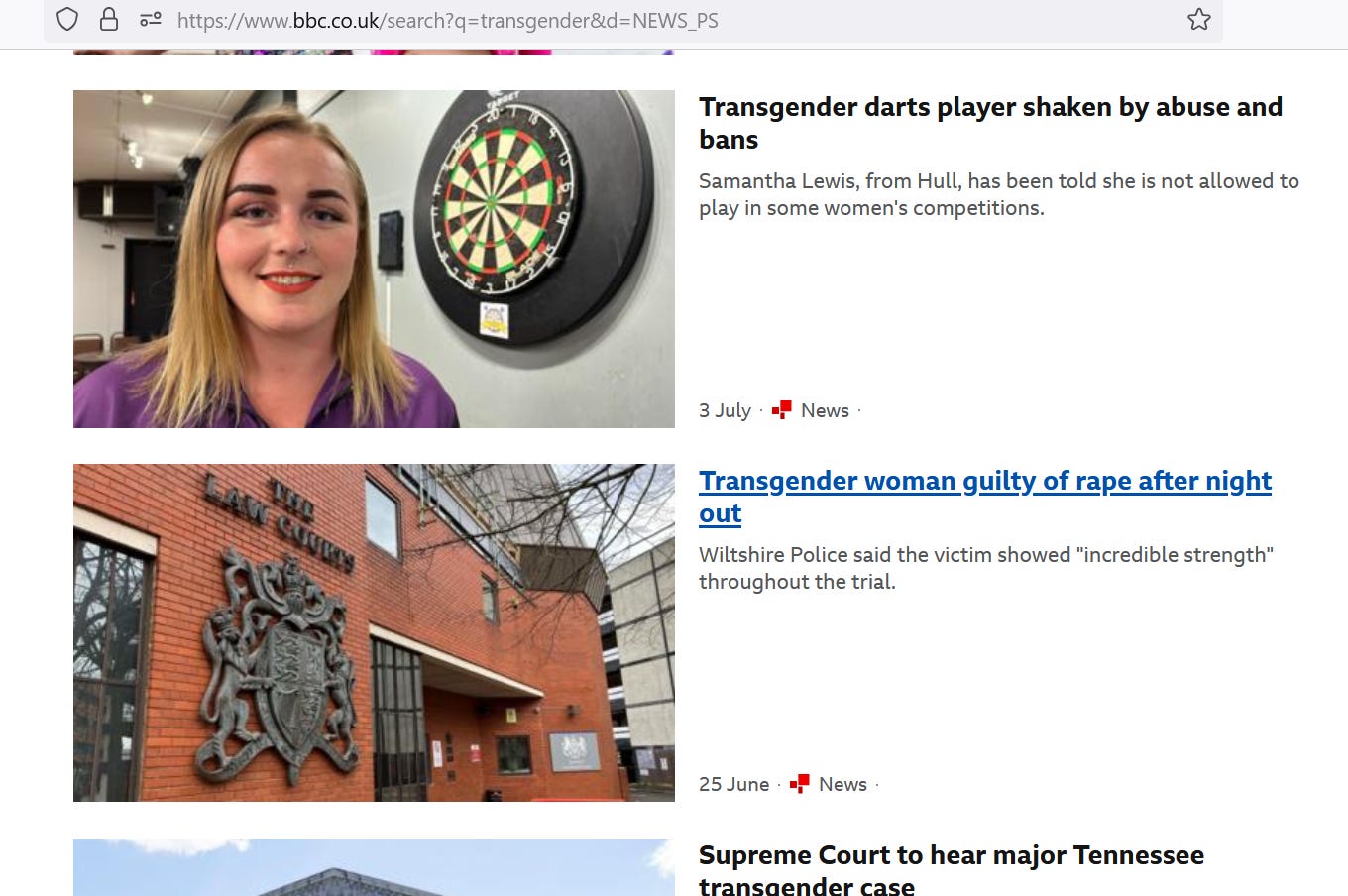Does it matter if a story about a trans-identifying rapist is not tagged as transgender on the BBC?
They rarely are. Stories about rapist Lexi Secker were only given local tags: Swindon and Broad Blunsdon. In fact, they often have a single tag. Stories about murderer Scarlet Blake, who also put a cat in a blender, were only tagged Oxford. Stories on male paedophile Joanna Evans were only tagged Swansea, although he sexually assaulted three victims in East Lancashire.
Compared with headlines, tags are barely noticeable to most readers. They are right at the bottom of the story in the “Related Topics” section. If you click, you get all the other stories that have been tagged with that topic. But their importance goes far beyond that.
The BBC system is not totally transparent and is sometimes chaotic, but tags will determine where a story appears on the BBC, how high up it appears in a search result, and whether it is recommended in individualised feeds. In other words, they influence how many readers will see it. And unless it’s tagged ‘Transgender people’ it won’t appear on the ‘Transgender people’ page.
Tags also influence other algorithms outside the BBC. How exactly Google orders search results is a closely guarded commercial secret, but tags will be part of it with all other metadata: location, subtitles etc.
Search engines also gives more weighting to stories on large sites that are updated frequently, which gives the BBC a massive advantage over an identical story on a smaller site. Viewer metrics will also boost or sink a story. If a story is popular, with lots of hits, likes, shares and comments, it will move higher up the rankings, resulting in more hits and cementing its position at the top of the page.
All of this means what seems a minor categorisation choice on an individual story has reach far beyond the site itself, for a long, long time.
The overall effect is to suppress any connection between trans-identifying males and sexual or violent offending; and to promote them instead as benign role models or as victims.
And this will also have influence on the next generation of AI searches. Very large numbers of celebratory - or even neutral - stories about trans-identifying people will outweigh even high-profile criminal cases. This may explain the much-noted BBC obsession with shoe-horning drag queens into every story. They are flooding the dataset to shift the outcomes.
Men in dresses aren’t just being normalised for today’s audience. They are being normalised for the AI generated searches and stories of the future.
It’s not only criminals. Other negative articles about transgender ideology also don’t get a transgender tag. A recent story about Dr Hilary Cass’s comments about puberty blockers was mysteriously only tagged Devon. This related to her review of the now infamous Tavistock clinic. Tavistock is a town in Devon, but the story clearly stated “London’s Tavistock clinic”. This raises questions as to exactly how the tags are generated. It would be normal for journalists to add some suitable tags, and for these to be reviewed by editors. But this odd error suggests some other process.
Another example: this story isn’t tagged ‘censuses’ so doesn’t appear on the Censuses page, where you would expect to see it, or on the Censuses in the UK page. It’s the natural tag - why is it omitted? It makes the story harder to find.
Is it normal for stories to only have a single category? Though it can happen, it’s uncommon, for the simple reason that journalists and editors want their stories to be seen in as many searches as possible – to widen the potential audience, not narrow it.
To take a few crime-related stories from one day in October (17th), this article about a filthy animal sanctuary was tagged RSPCA, Boston and Animals. An update on the Sara Sharif murder case was tagged Pakistan, Woking and Surrey Police. The Tory politician’s wife jailed for a racist post was given five tags: Social media, Southport knife attacks, UK disorder 2024, Northampton and West Northamptonshire Council.
Sympathetic or positive stories about transgender people are given multiple tags, such as this, about waiting times for care, which was tagged Health, LGBT, NHS, Leeds and Transgender People. This wafer-thin piece about a Venezuelan drag queen was tagged Drag Queen, Transgender People, LGBT, Pride and Bristol.
Of course, tags are not the only way search results are produced. Ten years ago, prior to tags being used on BBC stories, John Barratt, Senior Product Manager for BBC Search, explained the basis of the then new algorithm:
The new search engine ranks the relevance of a document based on how often your search term appears in a document's title or headline, summary and then the body of the document itself, in that order. Then, we ‘boost’ the results depending on when they were published or broadcast. So if there were 2 news stories on Syria the one that was published 20 minutes ago would be ranked higher than the one published 2 days ago. But this upweighting only significantly impacts articles published in the last 24 hours.
This will still be the basis, and means stories can appear in a search for “transgender” even if they are not tagged as such, as shown below. The story on rapist Lexi Secker appears - just - on the first page of results on a BBC search, based on the use of the word in the headline.
John Barratt’s remarks may explain the reluctance to use the term trans or transgender in any headlines on negative stories. The less association there is, the fewer the readers, not just now but for a long time to come.





I'm very cynical these days and always check stories. You'll be glad to know that your story is true. I did a search on BBC news for the last month and found this story from yesterday 21/10/2024. "Trans socialite did serve her jail term, Nigerian panel finds".. It had two tags, "Nigeria" and "Africa". I searched BBC using the "Transgender People" tag and found nearly 1000 stories and very few mentions of murderers or sex offenders. Even Andrew Miller, also known as Amy George, the Scottish butcher who kidnapped a girl last year had just one tag "Scotland". Perhaps someone at the BBC should run a story about this bias. I wonder what the tags would be?
Fascinating, thanks! This article certainly explains a lot.